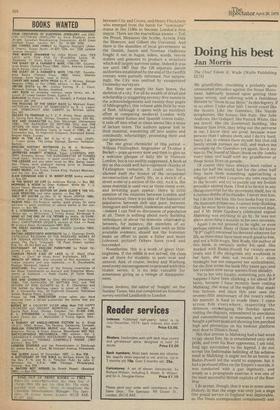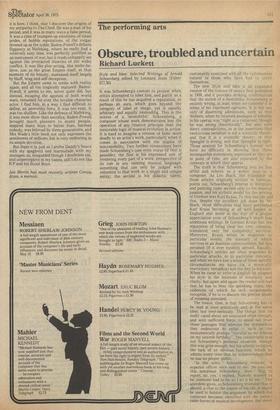Doing his best
Jan Morris
The Chief Eileen K. Wade (Wolfe Publishing £2.75)
My grandfather, cherishing a probably quite unreasoned prejudice against the Scout Move ment, habitually insisted upon getting their name wrong, and referring with a fastidious
distaste to "those Scout Boys." In this bigotry, if in no other, I take after him. I never could like the Scouts. Like the Guardian, like Haydn symphonies, like horses, like Italy, like Julie Andrews, like Godspell, like Patrick White, like sea travel, like the Economist building, like Senator Sam Irvin, they bring out the perverse in me. I know they are good, because wiser persons than I admire them, and I do try hard, really I do, to admire them myself: but that old family streak pursues me still, and makes me scrumple up the Guardian yet again, block my ears to The Sound of Music, book on the Jumbo every time, and scoff with my grandfather at those Scout Boys on parade.
Of course they have always been rather a joke for half the world, but for the other half they have been something approaching a religion: and when I examine my own reaction to the Scouts, and try to puzzle out my foolish prejudice against them, I find it to lie not in any cheap contempt for the movement itself, but in a curious dislike of its founder. I never met him, but I do not like him. His face looks foxy to me. His humours irritate me. I cannot help thinking that he must have been a very conceited man, and if Mr Brian G,ardner's celebrated exposé Mafeking was anything to go by, he was not above stretching a statistic in his own interests.
Again I do not pretend to be right, or even perhaps rational. Many of those who did know "B-P" (ugh!) remained his devoted admirers for life, so there must have been much good to him, and not a little magic. Mrs Wade, the author of this book, is certainly under his spell. She worked with Baden-Powell for twenty-seven years, and if she recognises any weakness in her hero, she does not record it even • hindsight has not tempered her enthrallment, for she first wrote the book fifty years ago, and her revision now never wavers from idolatry.
Yet to her very loyalty, something jars. As it happens I have been thinking a lot about B-P lately, because I have recently been visiting Mafeking, the scene of the exploit that made him famous, and since this year sees the seventy-fifth anniversary of the town's relief, his memory is hard to evade there. I came across him everywhere, inspecting the defences, encouraging the Sunday sports, visiting the dugouts, remembered in anecdotes and commemorated in museums, and I even bought a picture postcard showing him perched high and precarious on his lookout platform next door to Dixon's Hotel.
Not that anyone in Mafeking had a bad word to say about him. He is remembered only with pride, and even his Boer opponents, I am told, long ago succumbed to his legend. I do not accept the fashionable belittling of his achievement in Mafeking: it might not be as heroic as Baden-Powell led the world to suppose, but it had a profound effect on the Empire's morale, it was conducted with a gay ingenuity, and simply as a propaganda exercise it was one of the most successful British exploits of the Boer War.
do accept, though, that it was in some sense illu-sory, in that the siege was only Just a siege (the postal service to England was deplorable, so The Times correspondent complained): and
it is here, I think, that I discover the origins of my antipathy to The Chief. He was a man of his period, and it was in many ways a false period. It was a time of trumped-up emotions, of tinsel prides, of bubble reputations, of the vulgar dressed up as the noble. Baden-Powell's defiant flippancy at Mafeking, where he really had a relatively easy time, was perfectly justified as an instrument of war, but it reads unhappily set against the protracted miseries of the wider conflict. It was like play-acting, like make-believe, just as the great Empire itself, at that moment of its history, sustained itself largely by bluff, brag and self-deception.
But the Empire came to terms with reality again, and all too tragically matured: BadenPowell, it seems to me, never quite did, but instead, escaping the agonies of both world wars, remained for ever the lovable character actor. I find him, in a way I find difficult to define, an unworthy hero. It was too easy. It was too shallow. Like the defence of Mafeking, it was more show than sacrifice. Baden-Powell brought much pleasure to many people, inspired many boys to better liv,es, harmed nobody, was beloved by three generations, and Mrs Wade's little book not only expresses the sentiments of millions, but is very endearing in its simple devotion.
But there it is, just as I prefer Daddy's Sauce with my spaghetti and marmalade with my sausages, so, misguided though I doubtless am, and unperceptive in my tastes, still I do not like B-P and his Scout Boys.
Jan Morris has most recently written Conundrum, a memoir.











































 Previous page
Previous page